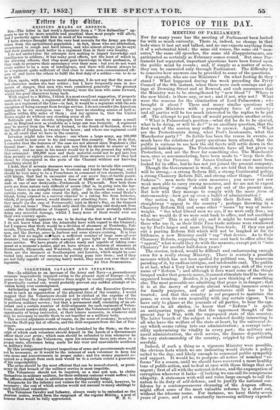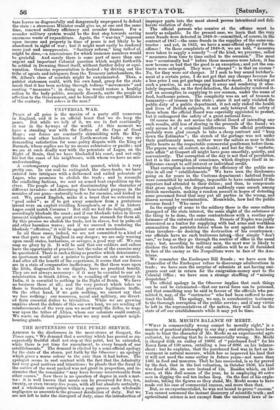TOPICS OF THE DAY.
MEETING OF PARLIAMENT.
NOT for many years has the meeting of Parliament been looked for with so much curiosity. There is, indeed, no change in that body since it last sat and talked, and no one expects anything from it et a substantial kind ; the same old voices, the same old " mea- sures," the same old speeches, the same old disappointments, are anticipated as certainly as February comes round. But since Par- liament last separated, important questions have been forced upon the public mind by events ; and, if simply as a matter of news, they can be answered only through Parliament. The difficulty is to conceive how answers can be provided to some of the questions. For example, who are our Ministers ? On what footing do they • stand ? What happened during the week preceding the Privy Council of the 8th instant, when there-were such comings and go- ings at Downing Street and at Bowood, and such assurances that the Ministry was to be strengthened by "new blood " ? Where is the new blood; is there any, or not ; and if not, why not ? What were the reasons for the elimination of Lord Palmerston ; who brought it about ? These and many similar questions will press upon Ministers with a peremptory force of curiosity ; and all parties will be too much interested in the replies to be put off. The attempt to put them off would precipitate another crisis.
"What is Palmerston's position—what did he do to be ejected, what is he doing, or will he do ? " is an ancillary question, that the first week of the session may suffice to answer. Again, "What are the Protectionists doing, what Peel's lieutenants, what the Manchester party ? " So fertile has been the recess in events, so much have the relations of party questions been altered, that the public is curious to see how the old facets will settle down in the political kaleidoscope. The Protectionists have all but given up Protection, and are the freer for something else. The Manchester men, once so accommodating, have been made to "keep their dis- tance" by the Premier. Sir James Graham has once more been looked feria office, but he has not yet joined the present company.
Though the Government is weak, we are told that its measures will be strong,—a strong Reform Bill, a strong Continental policy, a strong Chancery Reform Bill, and strong other things. " Credat Yudams" : men mete their own measures ; you never yet saw weak men able to carry strong measures, and we are not to expect that anything "strong" should be got out of the present men. But how will they manage to comply with the mere form of statesmanship—how get up even a ballet of administration ?
One notion is, that they will table their Reform Bill, and straightway "appeal to the country" ; perhaps throwing in a Chancery Reform Bill and some other " boons " by way of make- weight. " See what liberal men we are, if we were only free ; see what we would do if we were sent back to office, and not sacrificed to faction!" This is an old cry, and it might be turned against those who use it, as their little Free-trade notions wore swallowed up by Peel's larger and more living Free-trade. If they can put out a parting Reform Bill which will not be laughed at for its littleness, a new Ministry could "cap" that device. As to their Chancery Reform, supposing they were sent back to office after the "appeal," what would they do with the measure, except put it "into Chancery" for another half-dozen years ?
The session, indeed, would be difficult and embarrassing enough oven for a really strong Ministry. There is scarcely a possible measure which has not been spoiled for political use, by nauseous parading of it, by endless intrigue, and intolerable cant. The public ia at last, what a Tory lord was twenty years ago, sick of the very name of " Reform "; and although it does want some of the things lumped under that generic name, it cannot stimulate itself to face an organized humbug. Besides, it is just now thinking of something else. The most peaceable are admitting that peace is in danger; that it is at the mercy of despots abroad wielding immense armies for family 'mimeses, and of adventurers still less to be trusted ; and that this country is not prepared to maintain the peace, or even its own neutrality with any certain vigour. Yon have only to glance at the journals of all parties, to hear the con-
versation in all circles, to know that " Reform " is quite an antiquarian topic, and that the uppermost thought of the present day is War, with the unprepared state of this country. The latter branch of the subject is rendered doubly interesting to all who have the welfare of the state at heart, by the universal de-
cay which seems eating into our administration ; a corrupt imbe- cility undermining its vitality in every part; the military and naval administration, the civil service, the finance departments, the very statesmanship of the country, crippled by this political scrofula.
Indeed, if such a thing as a vigorous Ministry were possible,
the obvious facts which we are indicating would dictate a policy suited to the day, and likely enough to command public sympathy and support. It would be, to postpone all notice of nominal "re- forms "for a season, until we should have recovered a more healthy tone of public action, and to deal at once with those things that are urgent; first of all with the national defence, and the expurgation of corruption wherever it lurks—if lurking. we can call its conspicuous ubiquity. I statesman with will and voice large enough to call the nation to its duty of self-defence, and to justify the national con- fidence by a contemporaneous cleansing of the Augean offices, might effect some of the most valuable reforms by a short cut, without the irksome name. For instance, we have thirty-seven years of peace, and yet a constantly increasing military expendi. tare leaves us disgracefully and dangerously unprepared to defend the state : a strenuous Minister could give us, at one and the same time, renewed military efficiency and sounder finance. For a sounder military system would be the first step towards saving enormous waste of expenditure. Again, the " war-tax " imposed upon income and property in time of peace is not likely to be abandoned in sight of war ; but it might most easily be rendered more just and unoppressive. "Sanitary reform," long talked of, might be done,—a convenience for which immense numbers would be grateful. And surely there is some part of more than one urgent and important Colonial question which might forthwith be settled in Downing Street itself, without further delay or equi- vocation. Genuine representation is desired : by driving out the tribe of agents and intriguers from the Treasury antechambers, the -Bt. Alban's class of scandals might be exterminated. Thus, a patriot statesman could, with his own hand, grasp for the state much that it has been seeking through tedious " movements " and canting "measures"; in doing so, he would restore a health), action to the body politic, reconcile discords, unite the people in affection to the Government, and be himself the strongest Minister of the century. But where is the man ?



























 Previous page
Previous page